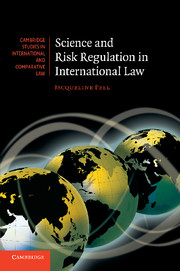Book contents
- Frontmatter
- Contents
- Preface
- Acknowledgements
- 1 Introduction: science and risk regulation in international law
- 2 Global risk governance and its legitimacy
- 3 Scientific rationality and risk in international law
- 4 Competing risk regulatory paradigms: sound science and the precautionary principle
- 5 Science and WTO regulation of SPS risk
- 6 Case studies of science and risk regulation in international law
- 7 Democratising global risk governance
- 8 What role for science in international risk regulation?
- Index
- CAMBRIDGE STUDIES IN INTERNATIONAL AND COMPARATIVE LAW
- References
7 - Democratising global risk governance
Published online by Cambridge University Press: 10 January 2011
- Frontmatter
- Contents
- Preface
- Acknowledgements
- 1 Introduction: science and risk regulation in international law
- 2 Global risk governance and its legitimacy
- 3 Scientific rationality and risk in international law
- 4 Competing risk regulatory paradigms: sound science and the precautionary principle
- 5 Science and WTO regulation of SPS risk
- 6 Case studies of science and risk regulation in international law
- 7 Democratising global risk governance
- 8 What role for science in international risk regulation?
- Index
- CAMBRIDGE STUDIES IN INTERNATIONAL AND COMPARATIVE LAW
- References
Summary
Introduction
As risk decision-making has moved increasingly from sites of national regulation to global governance structures, science and experts – aided by shared positivist and universalist traditions – have been readily able to relocate. They occupy a central place in the processes of international standard-setting organisations, under treaty provisions governing the assessment and management of risks and as part of advisory bodies to international adjudicators like those of the WTO dispute settlement system. Even in an international institution such as the Inter-governmental Panel on Climate Change – deliberately designed to create shared science–policy understandings of climate change risks – much attention has been paid to the best ways of bringing scientific expertise into its processes and to retaining credibility with the broader scientific community despite governmental involvement in the production of risk assessments. However, as the examples considered in the previous chapter illustrated, recognition of the importance of scientific input into global risk governance sits alongside a growing acknowledgement that science and/or technical risk assessments alone will generally offer inadequate foundations for effective and legitimate risk regulation at the international level.
Reflecting this, questions about the legitimacy of international risk decision-making are becoming an important topic of debate, both in the literature and in the practice of global institutions. Perspectives from many different fields have been brought to bear on the issue of the use of science in international risk regulation, including those of post-normal science, constructivist perspectives on risk, and science and technology studies of the co-production of scientific knowledge and risk policy.
- Type
- Chapter
- Information
- Science and Risk Regulation in International Law , pp. 337 - 375Publisher: Cambridge University PressPrint publication year: 2010



